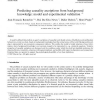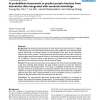59 search results - page 1 / 12 » Predicting causality ascriptions from background knowledge: ... |
IJAR
2008
13 years 4 months ago
2008
A model is defined that predicts an agent's ascriptions of causality (and related notions of facilitation and justification) between two events in a chain, based on backgroun...
ECAI
2006
Springer
13 years 8 months ago
2006
Springer
A model is defined that predicts an agent's ascriptions of causality (and related notions of facilitation and justification) between two events in a chain, based on background...
BMCBI
2008
13 years 4 months ago
2008
Background: Inferring cluster structure in microarray datasets is a fundamental task for the so-called -omic sciences. It is also a fundamental question in Statistics, Data Analys...
PROMISE
2010
12 years 11 months ago
2010
Background. Software defect prediction has been one of the central topics of software engineering. Predicted defect counts have been used mainly to assess software quality and est...
BMCBI
2008
13 years 4 months ago
2008
Background: The functional characterization of newly discovered proteins has been a challenge in the post-genomic era. Protein-protein interactions provide insights into the funct...


